Energy Management Impact in Hotel Industry: Crowne Plaza Auckland, NZ
VerifiedAdded on 2023/06/14
|20
|5105
|485
Report
AI Summary
This report investigates the impact of energy management in the hotel industry, using the Crowne Plaza hotel in Auckland as a case study. It explores the increasing importance of energy management due to rising energy costs, competition, and growing environmental awareness among tourists. The study employs a mixed-methods approach, including a survey of hotel employees and thematic analysis of manager interviews, to assess the benefits, challenges, and feasibility of implementing renewable energy sources. The findings reveal that while there is awareness of potential benefits, a lack of education about sustainability practices leads to reluctance in adopting them. The report further discusses the perspectives of both customers and industry experts, highlighting the importance of sustainability practices in enhancing reputation, reducing operational costs, and increasing customer satisfaction. Desklib offers additional resources and solved assignments for students studying related topics.
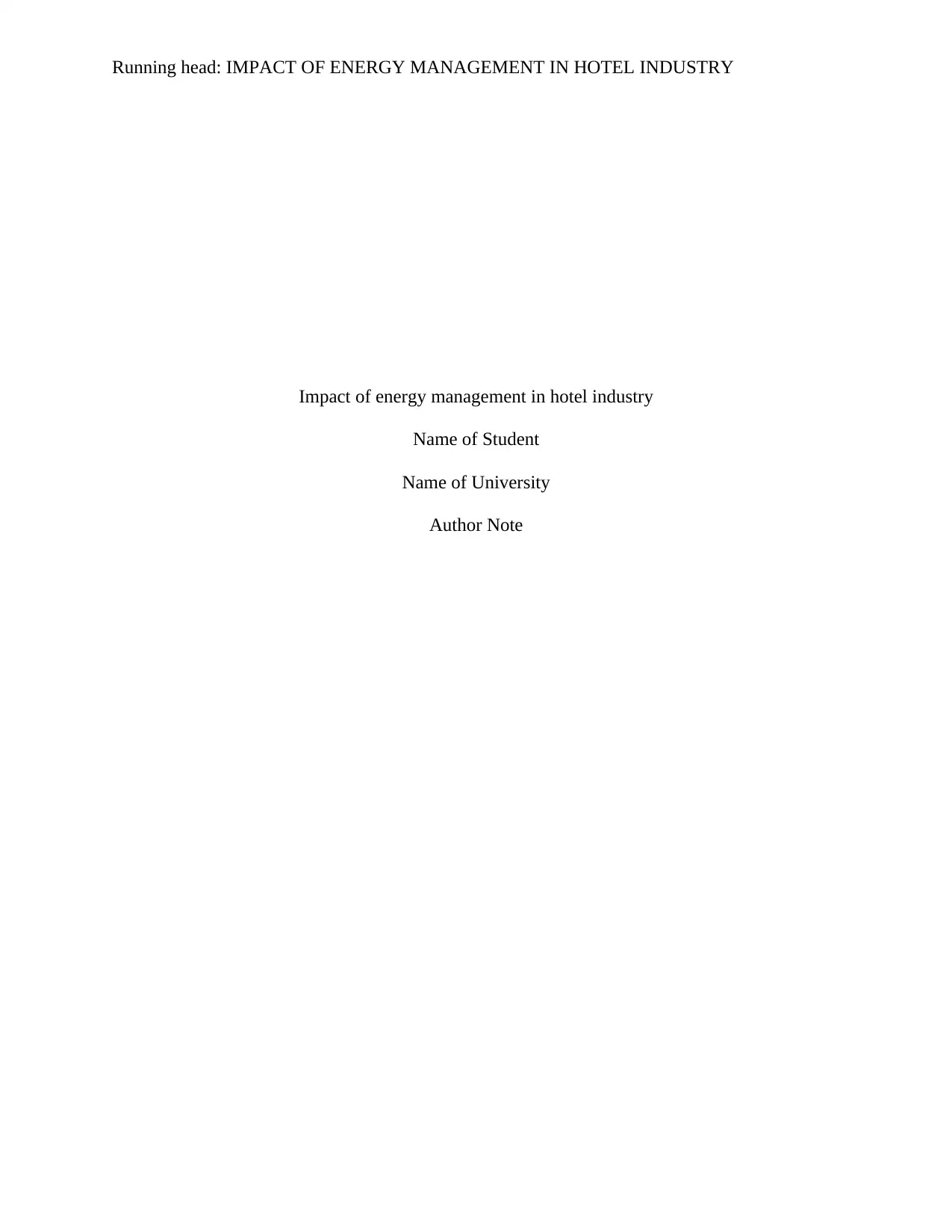
Running head: IMPACT OF ENERGY MANAGEMENT IN HOTEL INDUSTRY
Impact of energy management in hotel industry
Name of Student
Name of University
Author Note
Impact of energy management in hotel industry
Name of Student
Name of University
Author Note
Paraphrase This Document
Need a fresh take? Get an instant paraphrase of this document with our AI Paraphraser
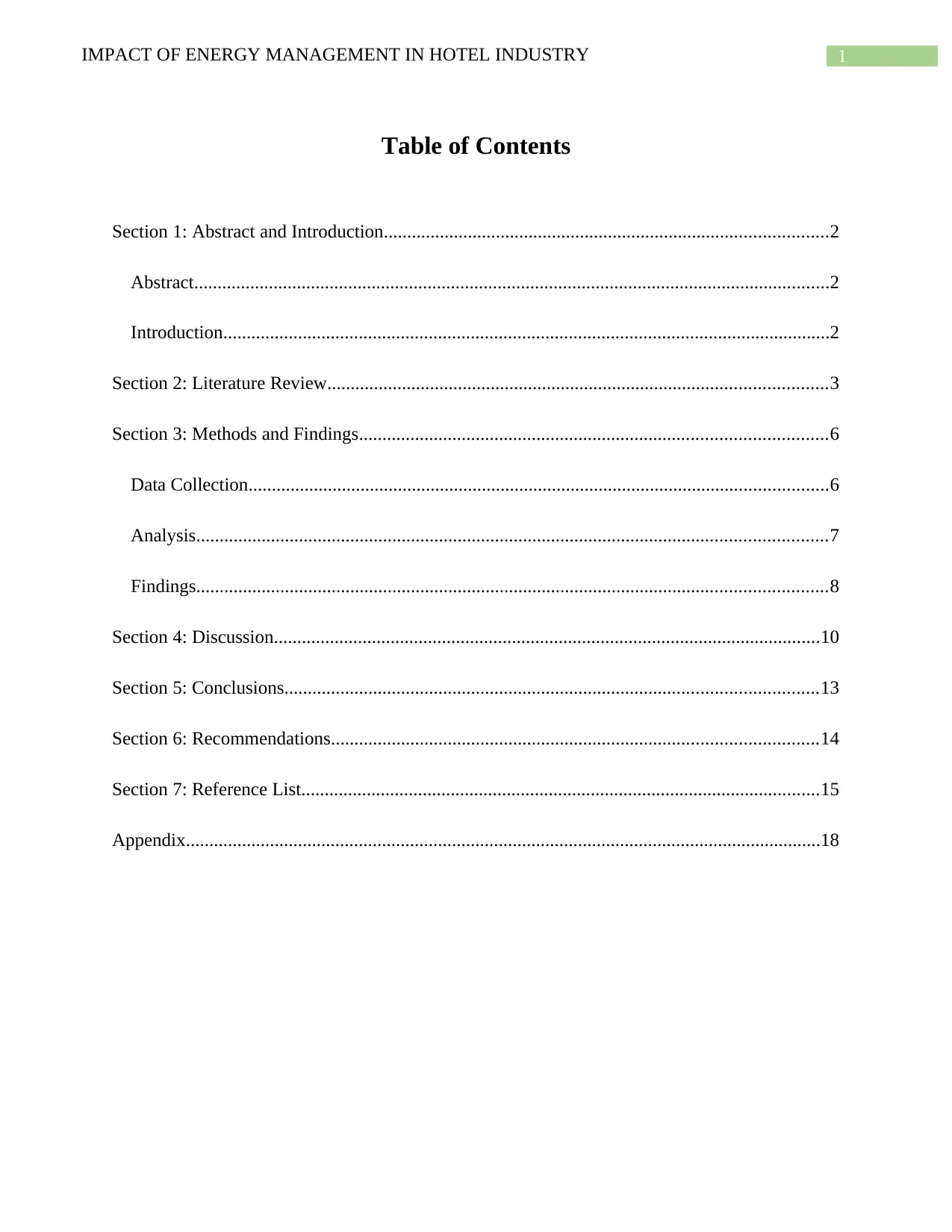
1IMPACT OF ENERGY MANAGEMENT IN HOTEL INDUSTRY
Table of Contents
Section 1: Abstract and Introduction...............................................................................................2
Abstract........................................................................................................................................2
Introduction..................................................................................................................................2
Section 2: Literature Review...........................................................................................................3
Section 3: Methods and Findings....................................................................................................6
Data Collection............................................................................................................................6
Analysis.......................................................................................................................................7
Findings.......................................................................................................................................8
Section 4: Discussion.....................................................................................................................10
Section 5: Conclusions..................................................................................................................13
Section 6: Recommendations........................................................................................................14
Section 7: Reference List...............................................................................................................15
Appendix........................................................................................................................................18
Table of Contents
Section 1: Abstract and Introduction...............................................................................................2
Abstract........................................................................................................................................2
Introduction..................................................................................................................................2
Section 2: Literature Review...........................................................................................................3
Section 3: Methods and Findings....................................................................................................6
Data Collection............................................................................................................................6
Analysis.......................................................................................................................................7
Findings.......................................................................................................................................8
Section 4: Discussion.....................................................................................................................10
Section 5: Conclusions..................................................................................................................13
Section 6: Recommendations........................................................................................................14
Section 7: Reference List...............................................................................................................15
Appendix........................................................................................................................................18
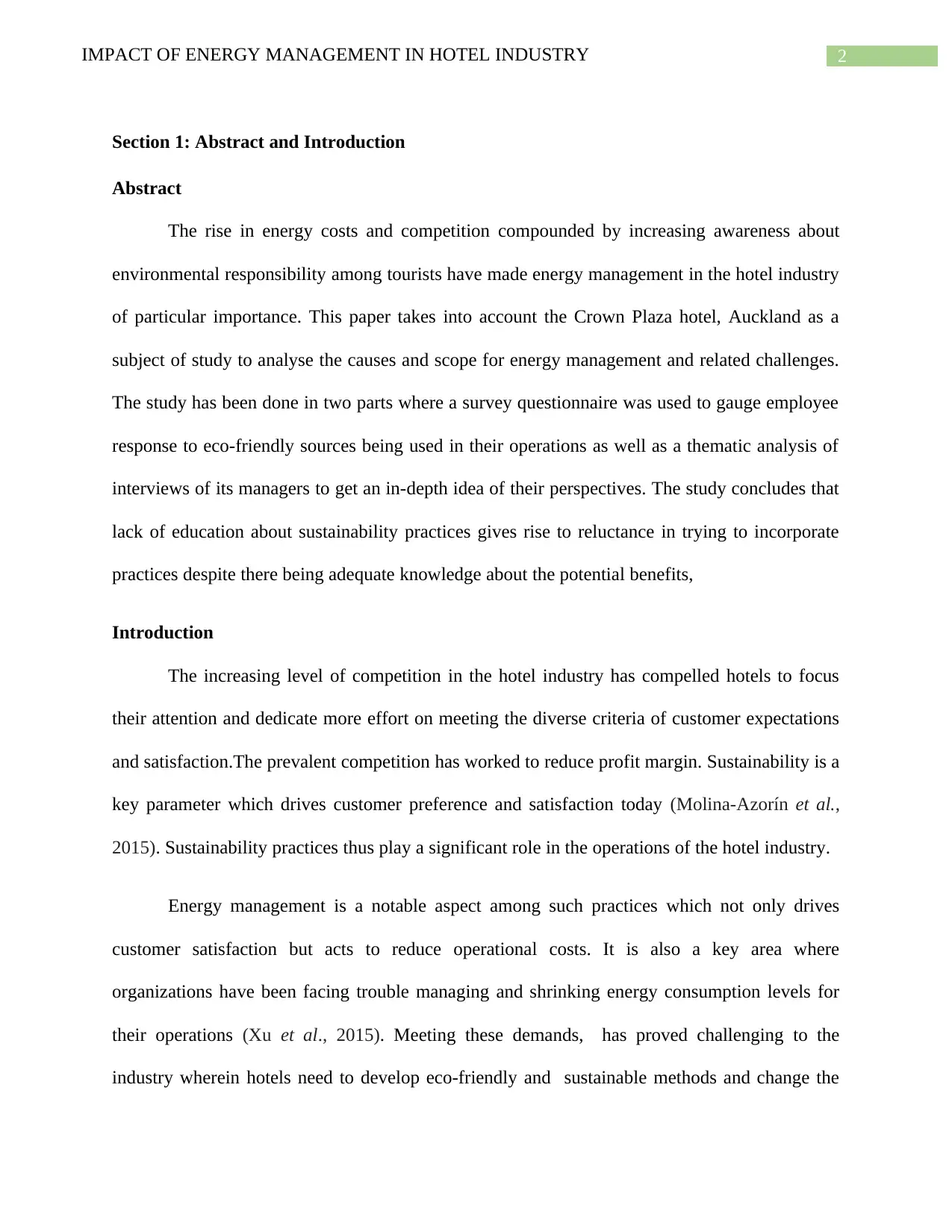
2IMPACT OF ENERGY MANAGEMENT IN HOTEL INDUSTRY
Section 1: Abstract and Introduction
Abstract
The rise in energy costs and competition compounded by increasing awareness about
environmental responsibility among tourists have made energy management in the hotel industry
of particular importance. This paper takes into account the Crown Plaza hotel, Auckland as a
subject of study to analyse the causes and scope for energy management and related challenges.
The study has been done in two parts where a survey questionnaire was used to gauge employee
response to eco-friendly sources being used in their operations as well as a thematic analysis of
interviews of its managers to get an in-depth idea of their perspectives. The study concludes that
lack of education about sustainability practices gives rise to reluctance in trying to incorporate
practices despite there being adequate knowledge about the potential benefits,
Introduction
The increasing level of competition in the hotel industry has compelled hotels to focus
their attention and dedicate more effort on meeting the diverse criteria of customer expectations
and satisfaction.The prevalent competition has worked to reduce profit margin. Sustainability is a
key parameter which drives customer preference and satisfaction today (Molina-Azorín et al.,
2015). Sustainability practices thus play a significant role in the operations of the hotel industry.
Energy management is a notable aspect among such practices which not only drives
customer satisfaction but acts to reduce operational costs. It is also a key area where
organizations have been facing trouble managing and shrinking energy consumption levels for
their operations (Xu et al., 2015). Meeting these demands, has proved challenging to the
industry wherein hotels need to develop eco-friendly and sustainable methods and change the
Section 1: Abstract and Introduction
Abstract
The rise in energy costs and competition compounded by increasing awareness about
environmental responsibility among tourists have made energy management in the hotel industry
of particular importance. This paper takes into account the Crown Plaza hotel, Auckland as a
subject of study to analyse the causes and scope for energy management and related challenges.
The study has been done in two parts where a survey questionnaire was used to gauge employee
response to eco-friendly sources being used in their operations as well as a thematic analysis of
interviews of its managers to get an in-depth idea of their perspectives. The study concludes that
lack of education about sustainability practices gives rise to reluctance in trying to incorporate
practices despite there being adequate knowledge about the potential benefits,
Introduction
The increasing level of competition in the hotel industry has compelled hotels to focus
their attention and dedicate more effort on meeting the diverse criteria of customer expectations
and satisfaction.The prevalent competition has worked to reduce profit margin. Sustainability is a
key parameter which drives customer preference and satisfaction today (Molina-Azorín et al.,
2015). Sustainability practices thus play a significant role in the operations of the hotel industry.
Energy management is a notable aspect among such practices which not only drives
customer satisfaction but acts to reduce operational costs. It is also a key area where
organizations have been facing trouble managing and shrinking energy consumption levels for
their operations (Xu et al., 2015). Meeting these demands, has proved challenging to the
industry wherein hotels need to develop eco-friendly and sustainable methods and change the
⊘ This is a preview!⊘
Do you want full access?
Subscribe today to unlock all pages.

Trusted by 1+ million students worldwide
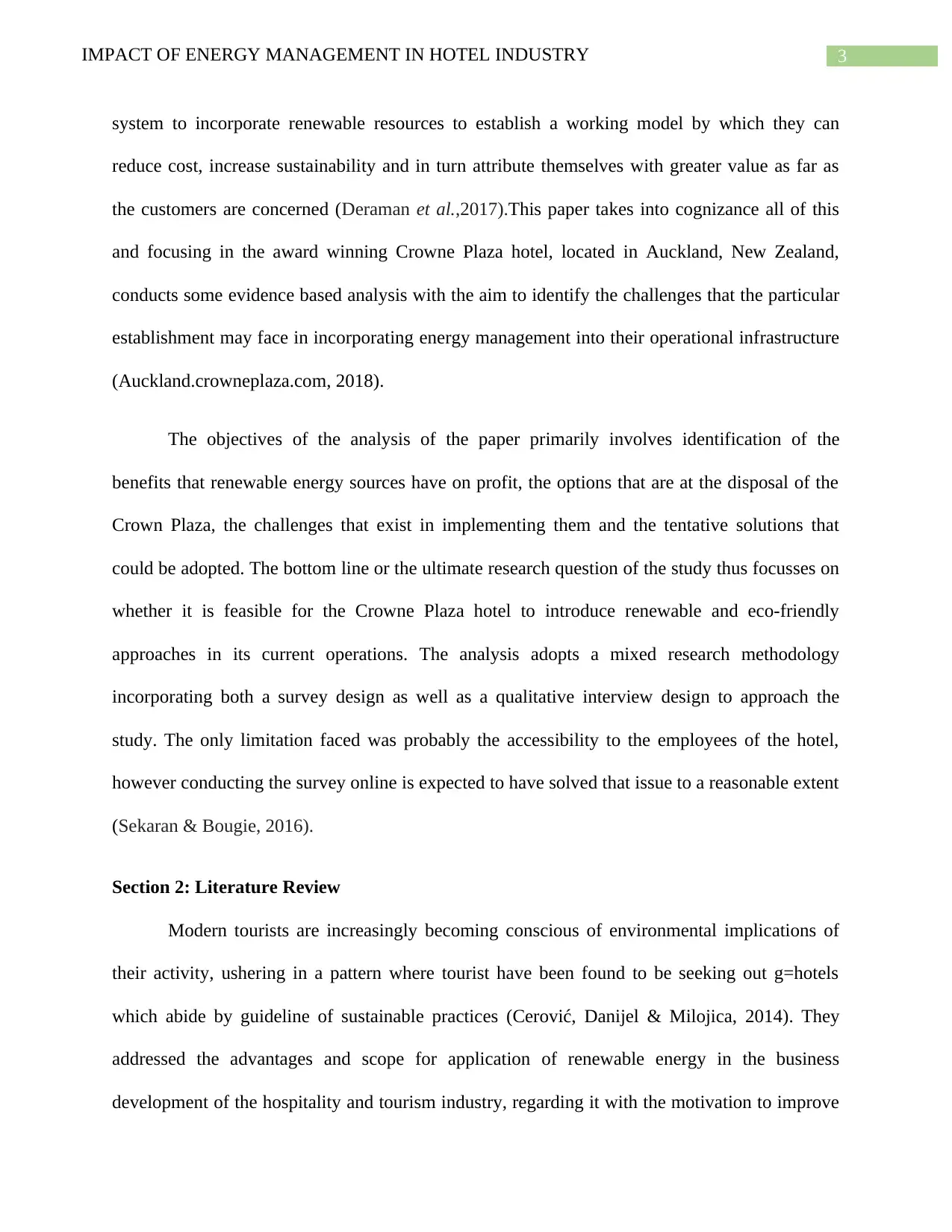
3IMPACT OF ENERGY MANAGEMENT IN HOTEL INDUSTRY
system to incorporate renewable resources to establish a working model by which they can
reduce cost, increase sustainability and in turn attribute themselves with greater value as far as
the customers are concerned (Deraman et al.,2017).This paper takes into cognizance all of this
and focusing in the award winning Crowne Plaza hotel, located in Auckland, New Zealand,
conducts some evidence based analysis with the aim to identify the challenges that the particular
establishment may face in incorporating energy management into their operational infrastructure
(Auckland.crowneplaza.com, 2018).
The objectives of the analysis of the paper primarily involves identification of the
benefits that renewable energy sources have on profit, the options that are at the disposal of the
Crown Plaza, the challenges that exist in implementing them and the tentative solutions that
could be adopted. The bottom line or the ultimate research question of the study thus focusses on
whether it is feasible for the Crowne Plaza hotel to introduce renewable and eco-friendly
approaches in its current operations. The analysis adopts a mixed research methodology
incorporating both a survey design as well as a qualitative interview design to approach the
study. The only limitation faced was probably the accessibility to the employees of the hotel,
however conducting the survey online is expected to have solved that issue to a reasonable extent
(Sekaran & Bougie, 2016).
Section 2: Literature Review
Modern tourists are increasingly becoming conscious of environmental implications of
their activity, ushering in a pattern where tourist have been found to be seeking out g=hotels
which abide by guideline of sustainable practices (Cerović, Danijel & Milojica, 2014). They
addressed the advantages and scope for application of renewable energy in the business
development of the hospitality and tourism industry, regarding it with the motivation to improve
system to incorporate renewable resources to establish a working model by which they can
reduce cost, increase sustainability and in turn attribute themselves with greater value as far as
the customers are concerned (Deraman et al.,2017).This paper takes into cognizance all of this
and focusing in the award winning Crowne Plaza hotel, located in Auckland, New Zealand,
conducts some evidence based analysis with the aim to identify the challenges that the particular
establishment may face in incorporating energy management into their operational infrastructure
(Auckland.crowneplaza.com, 2018).
The objectives of the analysis of the paper primarily involves identification of the
benefits that renewable energy sources have on profit, the options that are at the disposal of the
Crown Plaza, the challenges that exist in implementing them and the tentative solutions that
could be adopted. The bottom line or the ultimate research question of the study thus focusses on
whether it is feasible for the Crowne Plaza hotel to introduce renewable and eco-friendly
approaches in its current operations. The analysis adopts a mixed research methodology
incorporating both a survey design as well as a qualitative interview design to approach the
study. The only limitation faced was probably the accessibility to the employees of the hotel,
however conducting the survey online is expected to have solved that issue to a reasonable extent
(Sekaran & Bougie, 2016).
Section 2: Literature Review
Modern tourists are increasingly becoming conscious of environmental implications of
their activity, ushering in a pattern where tourist have been found to be seeking out g=hotels
which abide by guideline of sustainable practices (Cerović, Danijel & Milojica, 2014). They
addressed the advantages and scope for application of renewable energy in the business
development of the hospitality and tourism industry, regarding it with the motivation to improve
Paraphrase This Document
Need a fresh take? Get an instant paraphrase of this document with our AI Paraphraser
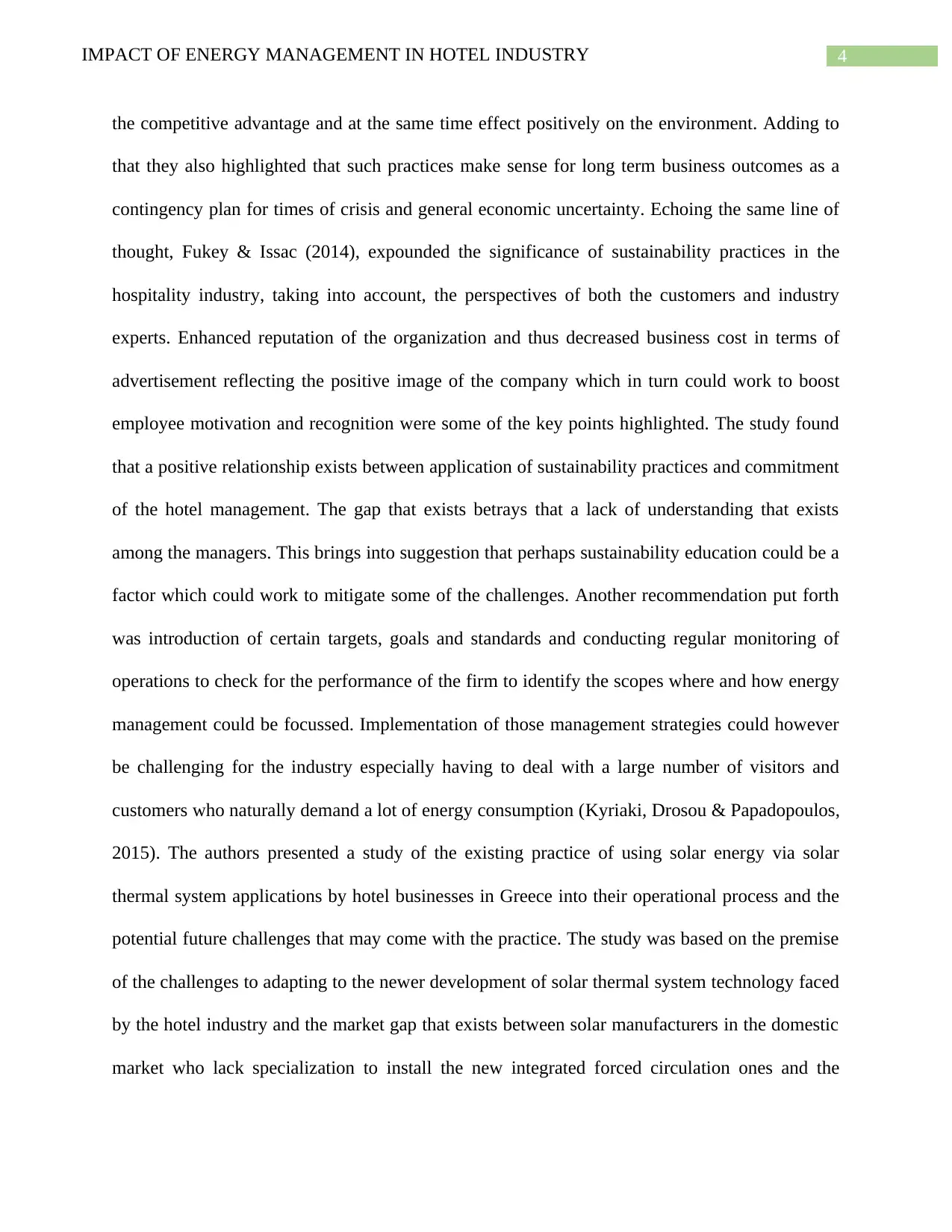
4IMPACT OF ENERGY MANAGEMENT IN HOTEL INDUSTRY
the competitive advantage and at the same time effect positively on the environment. Adding to
that they also highlighted that such practices make sense for long term business outcomes as a
contingency plan for times of crisis and general economic uncertainty. Echoing the same line of
thought, Fukey & Issac (2014), expounded the significance of sustainability practices in the
hospitality industry, taking into account, the perspectives of both the customers and industry
experts. Enhanced reputation of the organization and thus decreased business cost in terms of
advertisement reflecting the positive image of the company which in turn could work to boost
employee motivation and recognition were some of the key points highlighted. The study found
that a positive relationship exists between application of sustainability practices and commitment
of the hotel management. The gap that exists betrays that a lack of understanding that exists
among the managers. This brings into suggestion that perhaps sustainability education could be a
factor which could work to mitigate some of the challenges. Another recommendation put forth
was introduction of certain targets, goals and standards and conducting regular monitoring of
operations to check for the performance of the firm to identify the scopes where and how energy
management could be focussed. Implementation of those management strategies could however
be challenging for the industry especially having to deal with a large number of visitors and
customers who naturally demand a lot of energy consumption (Kyriaki, Drosou & Papadopoulos,
2015). The authors presented a study of the existing practice of using solar energy via solar
thermal system applications by hotel businesses in Greece into their operational process and the
potential future challenges that may come with the practice. The study was based on the premise
of the challenges to adapting to the newer development of solar thermal system technology faced
by the hotel industry and the market gap that exists between solar manufacturers in the domestic
market who lack specialization to install the new integrated forced circulation ones and the
the competitive advantage and at the same time effect positively on the environment. Adding to
that they also highlighted that such practices make sense for long term business outcomes as a
contingency plan for times of crisis and general economic uncertainty. Echoing the same line of
thought, Fukey & Issac (2014), expounded the significance of sustainability practices in the
hospitality industry, taking into account, the perspectives of both the customers and industry
experts. Enhanced reputation of the organization and thus decreased business cost in terms of
advertisement reflecting the positive image of the company which in turn could work to boost
employee motivation and recognition were some of the key points highlighted. The study found
that a positive relationship exists between application of sustainability practices and commitment
of the hotel management. The gap that exists betrays that a lack of understanding that exists
among the managers. This brings into suggestion that perhaps sustainability education could be a
factor which could work to mitigate some of the challenges. Another recommendation put forth
was introduction of certain targets, goals and standards and conducting regular monitoring of
operations to check for the performance of the firm to identify the scopes where and how energy
management could be focussed. Implementation of those management strategies could however
be challenging for the industry especially having to deal with a large number of visitors and
customers who naturally demand a lot of energy consumption (Kyriaki, Drosou & Papadopoulos,
2015). The authors presented a study of the existing practice of using solar energy via solar
thermal system applications by hotel businesses in Greece into their operational process and the
potential future challenges that may come with the practice. The study was based on the premise
of the challenges to adapting to the newer development of solar thermal system technology faced
by the hotel industry and the market gap that exists between solar manufacturers in the domestic
market who lack specialization to install the new integrated forced circulation ones and the
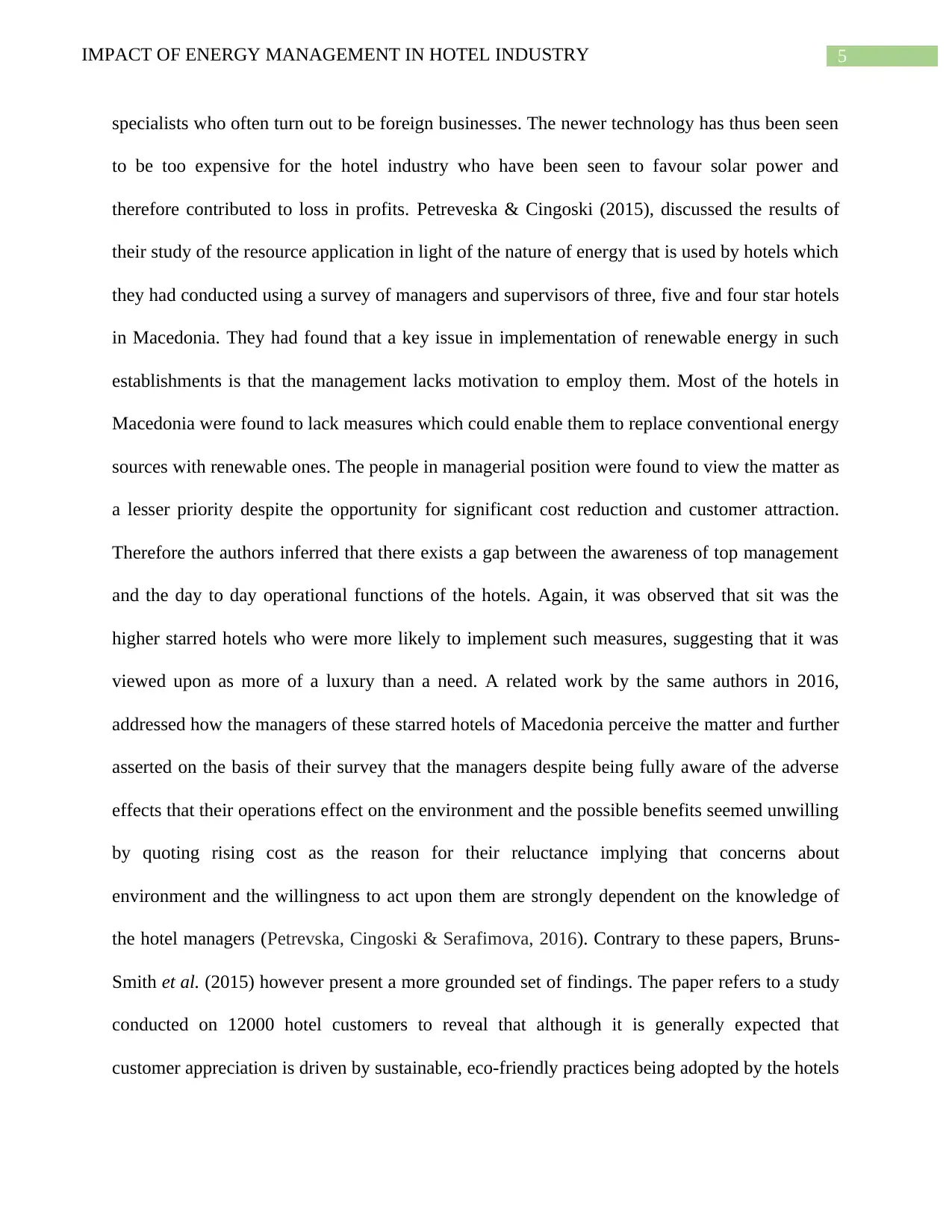
5IMPACT OF ENERGY MANAGEMENT IN HOTEL INDUSTRY
specialists who often turn out to be foreign businesses. The newer technology has thus been seen
to be too expensive for the hotel industry who have been seen to favour solar power and
therefore contributed to loss in profits. Petreveska & Cingoski (2015), discussed the results of
their study of the resource application in light of the nature of energy that is used by hotels which
they had conducted using a survey of managers and supervisors of three, five and four star hotels
in Macedonia. They had found that a key issue in implementation of renewable energy in such
establishments is that the management lacks motivation to employ them. Most of the hotels in
Macedonia were found to lack measures which could enable them to replace conventional energy
sources with renewable ones. The people in managerial position were found to view the matter as
a lesser priority despite the opportunity for significant cost reduction and customer attraction.
Therefore the authors inferred that there exists a gap between the awareness of top management
and the day to day operational functions of the hotels. Again, it was observed that sit was the
higher starred hotels who were more likely to implement such measures, suggesting that it was
viewed upon as more of a luxury than a need. A related work by the same authors in 2016,
addressed how the managers of these starred hotels of Macedonia perceive the matter and further
asserted on the basis of their survey that the managers despite being fully aware of the adverse
effects that their operations effect on the environment and the possible benefits seemed unwilling
by quoting rising cost as the reason for their reluctance implying that concerns about
environment and the willingness to act upon them are strongly dependent on the knowledge of
the hotel managers (Petrevska, Cingoski & Serafimova, 2016). Contrary to these papers, Bruns-
Smith et al. (2015) however present a more grounded set of findings. The paper refers to a study
conducted on 12000 hotel customers to reveal that although it is generally expected that
customer appreciation is driven by sustainable, eco-friendly practices being adopted by the hotels
specialists who often turn out to be foreign businesses. The newer technology has thus been seen
to be too expensive for the hotel industry who have been seen to favour solar power and
therefore contributed to loss in profits. Petreveska & Cingoski (2015), discussed the results of
their study of the resource application in light of the nature of energy that is used by hotels which
they had conducted using a survey of managers and supervisors of three, five and four star hotels
in Macedonia. They had found that a key issue in implementation of renewable energy in such
establishments is that the management lacks motivation to employ them. Most of the hotels in
Macedonia were found to lack measures which could enable them to replace conventional energy
sources with renewable ones. The people in managerial position were found to view the matter as
a lesser priority despite the opportunity for significant cost reduction and customer attraction.
Therefore the authors inferred that there exists a gap between the awareness of top management
and the day to day operational functions of the hotels. Again, it was observed that sit was the
higher starred hotels who were more likely to implement such measures, suggesting that it was
viewed upon as more of a luxury than a need. A related work by the same authors in 2016,
addressed how the managers of these starred hotels of Macedonia perceive the matter and further
asserted on the basis of their survey that the managers despite being fully aware of the adverse
effects that their operations effect on the environment and the possible benefits seemed unwilling
by quoting rising cost as the reason for their reluctance implying that concerns about
environment and the willingness to act upon them are strongly dependent on the knowledge of
the hotel managers (Petrevska, Cingoski & Serafimova, 2016). Contrary to these papers, Bruns-
Smith et al. (2015) however present a more grounded set of findings. The paper refers to a study
conducted on 12000 hotel customers to reveal that although it is generally expected that
customer appreciation is driven by sustainable, eco-friendly practices being adopted by the hotels
⊘ This is a preview!⊘
Do you want full access?
Subscribe today to unlock all pages.

Trusted by 1+ million students worldwide
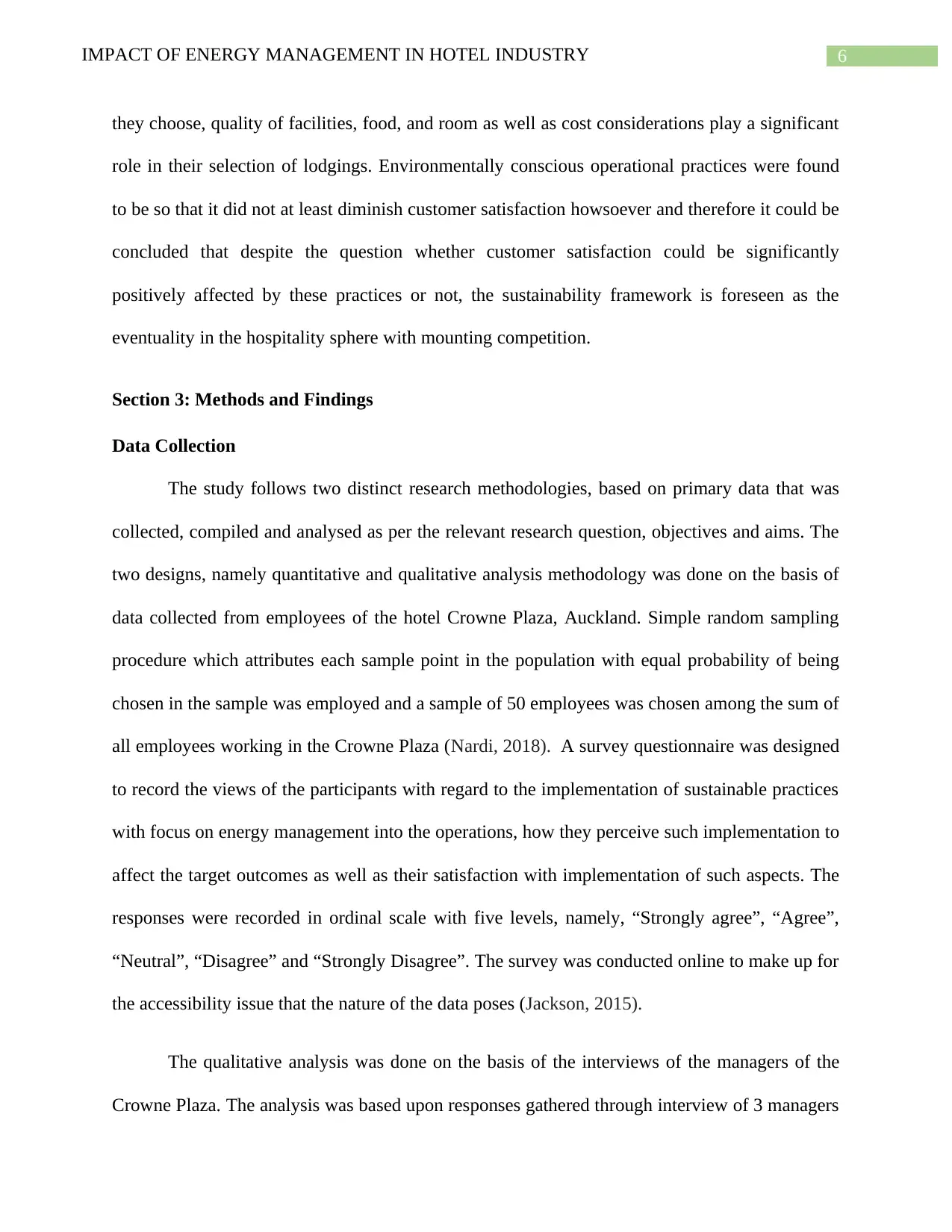
6IMPACT OF ENERGY MANAGEMENT IN HOTEL INDUSTRY
they choose, quality of facilities, food, and room as well as cost considerations play a significant
role in their selection of lodgings. Environmentally conscious operational practices were found
to be so that it did not at least diminish customer satisfaction howsoever and therefore it could be
concluded that despite the question whether customer satisfaction could be significantly
positively affected by these practices or not, the sustainability framework is foreseen as the
eventuality in the hospitality sphere with mounting competition.
Section 3: Methods and Findings
Data Collection
The study follows two distinct research methodologies, based on primary data that was
collected, compiled and analysed as per the relevant research question, objectives and aims. The
two designs, namely quantitative and qualitative analysis methodology was done on the basis of
data collected from employees of the hotel Crowne Plaza, Auckland. Simple random sampling
procedure which attributes each sample point in the population with equal probability of being
chosen in the sample was employed and a sample of 50 employees was chosen among the sum of
all employees working in the Crowne Plaza (Nardi, 2018). A survey questionnaire was designed
to record the views of the participants with regard to the implementation of sustainable practices
with focus on energy management into the operations, how they perceive such implementation to
affect the target outcomes as well as their satisfaction with implementation of such aspects. The
responses were recorded in ordinal scale with five levels, namely, “Strongly agree”, “Agree”,
“Neutral”, “Disagree” and “Strongly Disagree”. The survey was conducted online to make up for
the accessibility issue that the nature of the data poses (Jackson, 2015).
The qualitative analysis was done on the basis of the interviews of the managers of the
Crowne Plaza. The analysis was based upon responses gathered through interview of 3 managers
they choose, quality of facilities, food, and room as well as cost considerations play a significant
role in their selection of lodgings. Environmentally conscious operational practices were found
to be so that it did not at least diminish customer satisfaction howsoever and therefore it could be
concluded that despite the question whether customer satisfaction could be significantly
positively affected by these practices or not, the sustainability framework is foreseen as the
eventuality in the hospitality sphere with mounting competition.
Section 3: Methods and Findings
Data Collection
The study follows two distinct research methodologies, based on primary data that was
collected, compiled and analysed as per the relevant research question, objectives and aims. The
two designs, namely quantitative and qualitative analysis methodology was done on the basis of
data collected from employees of the hotel Crowne Plaza, Auckland. Simple random sampling
procedure which attributes each sample point in the population with equal probability of being
chosen in the sample was employed and a sample of 50 employees was chosen among the sum of
all employees working in the Crowne Plaza (Nardi, 2018). A survey questionnaire was designed
to record the views of the participants with regard to the implementation of sustainable practices
with focus on energy management into the operations, how they perceive such implementation to
affect the target outcomes as well as their satisfaction with implementation of such aspects. The
responses were recorded in ordinal scale with five levels, namely, “Strongly agree”, “Agree”,
“Neutral”, “Disagree” and “Strongly Disagree”. The survey was conducted online to make up for
the accessibility issue that the nature of the data poses (Jackson, 2015).
The qualitative analysis was done on the basis of the interviews of the managers of the
Crowne Plaza. The analysis was based upon responses gathered through interview of 3 managers
Paraphrase This Document
Need a fresh take? Get an instant paraphrase of this document with our AI Paraphraser
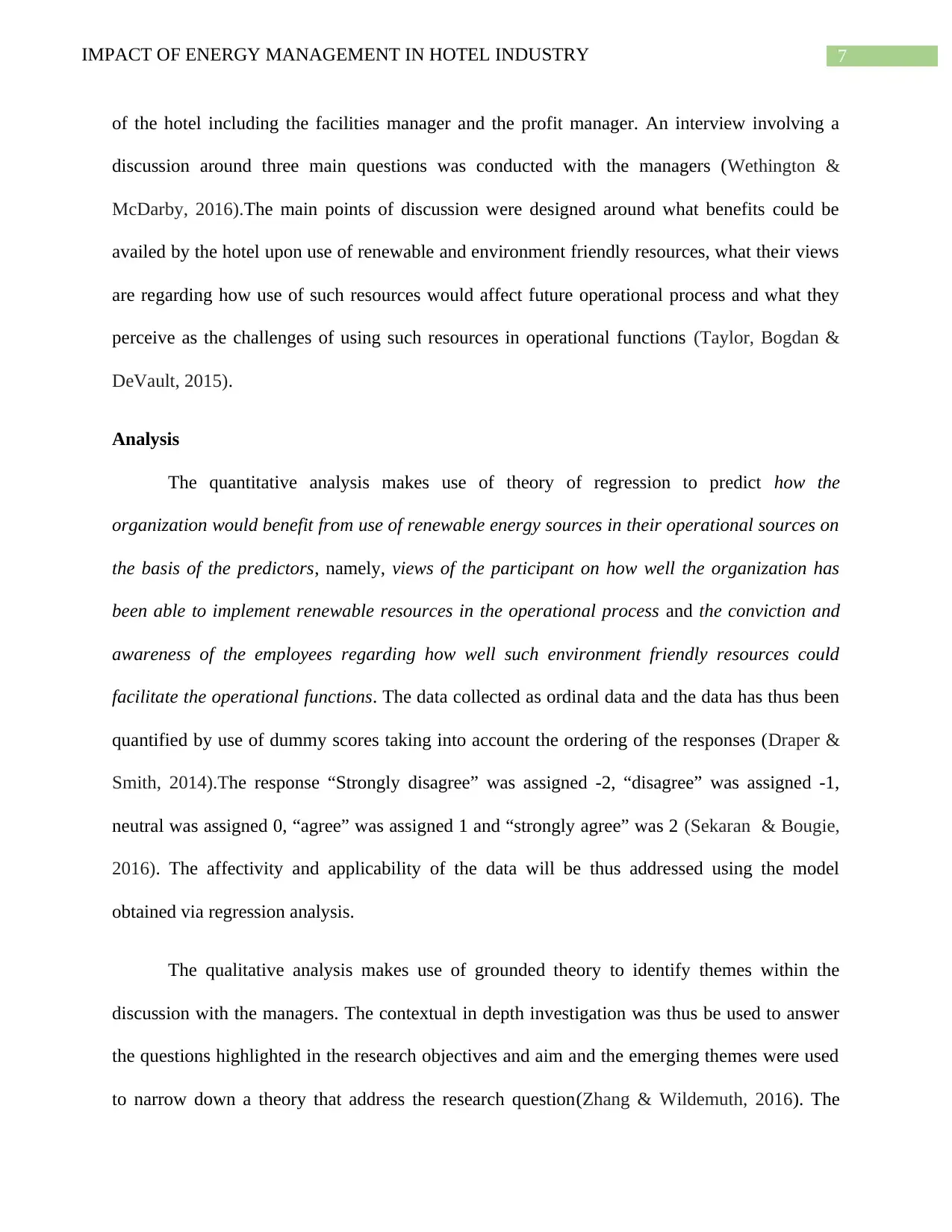
7IMPACT OF ENERGY MANAGEMENT IN HOTEL INDUSTRY
of the hotel including the facilities manager and the profit manager. An interview involving a
discussion around three main questions was conducted with the managers (Wethington &
McDarby, 2016).The main points of discussion were designed around what benefits could be
availed by the hotel upon use of renewable and environment friendly resources, what their views
are regarding how use of such resources would affect future operational process and what they
perceive as the challenges of using such resources in operational functions (Taylor, Bogdan &
DeVault, 2015).
Analysis
The quantitative analysis makes use of theory of regression to predict how the
organization would benefit from use of renewable energy sources in their operational sources on
the basis of the predictors, namely, views of the participant on how well the organization has
been able to implement renewable resources in the operational process and the conviction and
awareness of the employees regarding how well such environment friendly resources could
facilitate the operational functions. The data collected as ordinal data and the data has thus been
quantified by use of dummy scores taking into account the ordering of the responses (Draper &
Smith, 2014).The response “Strongly disagree” was assigned -2, “disagree” was assigned -1,
neutral was assigned 0, “agree” was assigned 1 and “strongly agree” was 2 (Sekaran & Bougie,
2016). The affectivity and applicability of the data will be thus addressed using the model
obtained via regression analysis.
The qualitative analysis makes use of grounded theory to identify themes within the
discussion with the managers. The contextual in depth investigation was thus be used to answer
the questions highlighted in the research objectives and aim and the emerging themes were used
to narrow down a theory that address the research question(Zhang & Wildemuth, 2016). The
of the hotel including the facilities manager and the profit manager. An interview involving a
discussion around three main questions was conducted with the managers (Wethington &
McDarby, 2016).The main points of discussion were designed around what benefits could be
availed by the hotel upon use of renewable and environment friendly resources, what their views
are regarding how use of such resources would affect future operational process and what they
perceive as the challenges of using such resources in operational functions (Taylor, Bogdan &
DeVault, 2015).
Analysis
The quantitative analysis makes use of theory of regression to predict how the
organization would benefit from use of renewable energy sources in their operational sources on
the basis of the predictors, namely, views of the participant on how well the organization has
been able to implement renewable resources in the operational process and the conviction and
awareness of the employees regarding how well such environment friendly resources could
facilitate the operational functions. The data collected as ordinal data and the data has thus been
quantified by use of dummy scores taking into account the ordering of the responses (Draper &
Smith, 2014).The response “Strongly disagree” was assigned -2, “disagree” was assigned -1,
neutral was assigned 0, “agree” was assigned 1 and “strongly agree” was 2 (Sekaran & Bougie,
2016). The affectivity and applicability of the data will be thus addressed using the model
obtained via regression analysis.
The qualitative analysis makes use of grounded theory to identify themes within the
discussion with the managers. The contextual in depth investigation was thus be used to answer
the questions highlighted in the research objectives and aim and the emerging themes were used
to narrow down a theory that address the research question(Zhang & Wildemuth, 2016). The
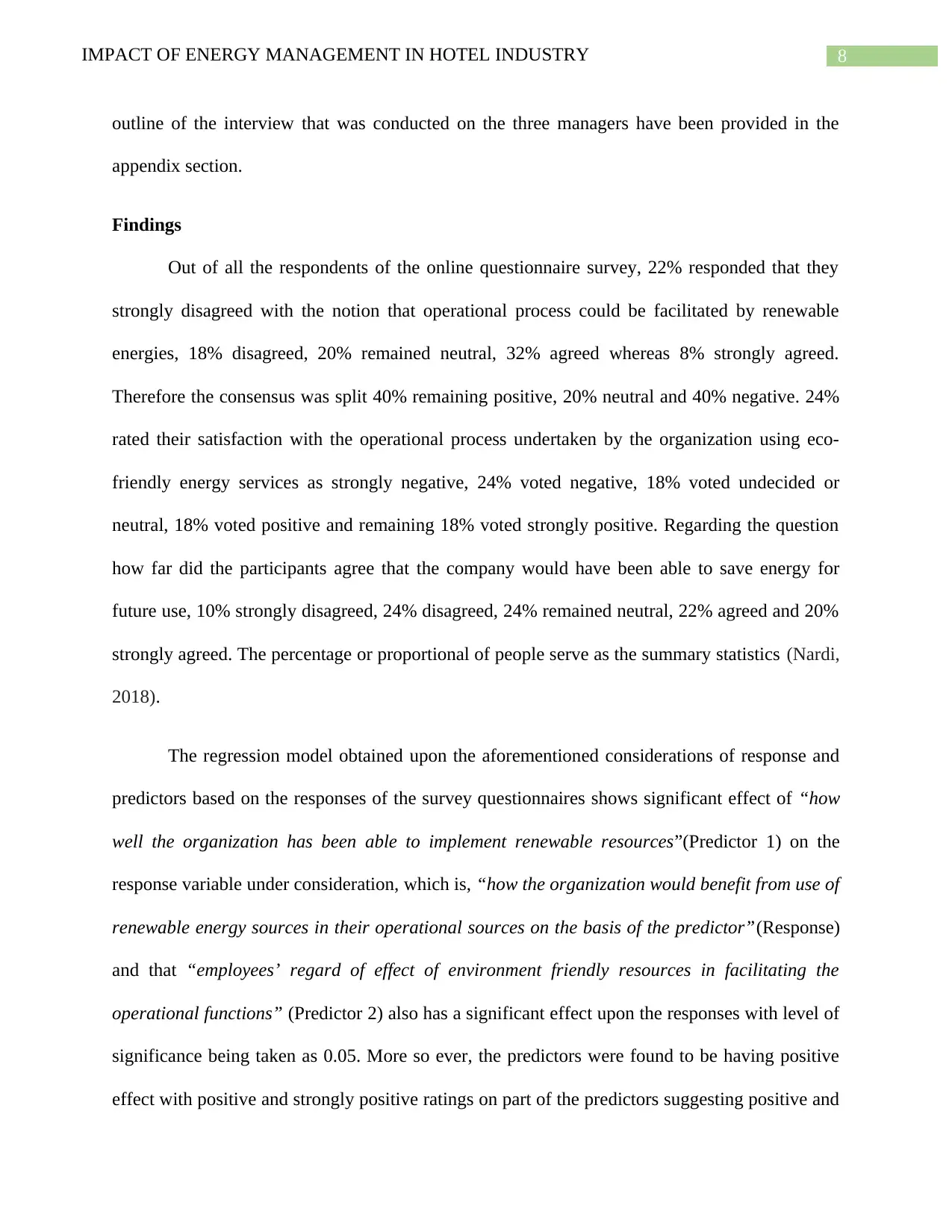
8IMPACT OF ENERGY MANAGEMENT IN HOTEL INDUSTRY
outline of the interview that was conducted on the three managers have been provided in the
appendix section.
Findings
Out of all the respondents of the online questionnaire survey, 22% responded that they
strongly disagreed with the notion that operational process could be facilitated by renewable
energies, 18% disagreed, 20% remained neutral, 32% agreed whereas 8% strongly agreed.
Therefore the consensus was split 40% remaining positive, 20% neutral and 40% negative. 24%
rated their satisfaction with the operational process undertaken by the organization using eco-
friendly energy services as strongly negative, 24% voted negative, 18% voted undecided or
neutral, 18% voted positive and remaining 18% voted strongly positive. Regarding the question
how far did the participants agree that the company would have been able to save energy for
future use, 10% strongly disagreed, 24% disagreed, 24% remained neutral, 22% agreed and 20%
strongly agreed. The percentage or proportional of people serve as the summary statistics (Nardi,
2018).
The regression model obtained upon the aforementioned considerations of response and
predictors based on the responses of the survey questionnaires shows significant effect of “how
well the organization has been able to implement renewable resources”(Predictor 1) on the
response variable under consideration, which is, “how the organization would benefit from use of
renewable energy sources in their operational sources on the basis of the predictor”(Response)
and that “employees’ regard of effect of environment friendly resources in facilitating the
operational functions” (Predictor 2) also has a significant effect upon the responses with level of
significance being taken as 0.05. More so ever, the predictors were found to be having positive
effect with positive and strongly positive ratings on part of the predictors suggesting positive and
outline of the interview that was conducted on the three managers have been provided in the
appendix section.
Findings
Out of all the respondents of the online questionnaire survey, 22% responded that they
strongly disagreed with the notion that operational process could be facilitated by renewable
energies, 18% disagreed, 20% remained neutral, 32% agreed whereas 8% strongly agreed.
Therefore the consensus was split 40% remaining positive, 20% neutral and 40% negative. 24%
rated their satisfaction with the operational process undertaken by the organization using eco-
friendly energy services as strongly negative, 24% voted negative, 18% voted undecided or
neutral, 18% voted positive and remaining 18% voted strongly positive. Regarding the question
how far did the participants agree that the company would have been able to save energy for
future use, 10% strongly disagreed, 24% disagreed, 24% remained neutral, 22% agreed and 20%
strongly agreed. The percentage or proportional of people serve as the summary statistics (Nardi,
2018).
The regression model obtained upon the aforementioned considerations of response and
predictors based on the responses of the survey questionnaires shows significant effect of “how
well the organization has been able to implement renewable resources”(Predictor 1) on the
response variable under consideration, which is, “how the organization would benefit from use of
renewable energy sources in their operational sources on the basis of the predictor”(Response)
and that “employees’ regard of effect of environment friendly resources in facilitating the
operational functions” (Predictor 2) also has a significant effect upon the responses with level of
significance being taken as 0.05. More so ever, the predictors were found to be having positive
effect with positive and strongly positive ratings on part of the predictors suggesting positive and
⊘ This is a preview!⊘
Do you want full access?
Subscribe today to unlock all pages.

Trusted by 1+ million students worldwide
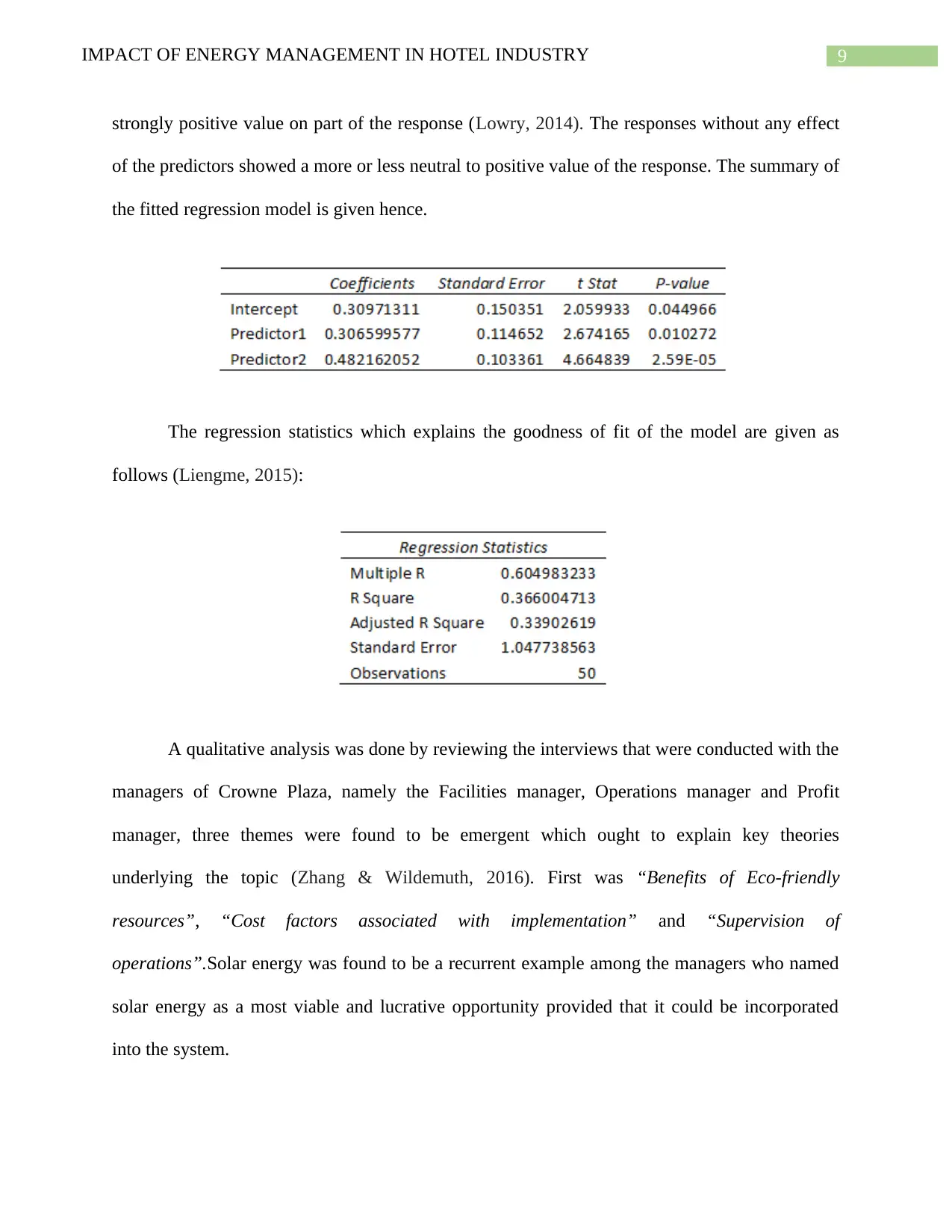
9IMPACT OF ENERGY MANAGEMENT IN HOTEL INDUSTRY
strongly positive value on part of the response (Lowry, 2014). The responses without any effect
of the predictors showed a more or less neutral to positive value of the response. The summary of
the fitted regression model is given hence.
The regression statistics which explains the goodness of fit of the model are given as
follows (Liengme, 2015):
A qualitative analysis was done by reviewing the interviews that were conducted with the
managers of Crowne Plaza, namely the Facilities manager, Operations manager and Profit
manager, three themes were found to be emergent which ought to explain key theories
underlying the topic (Zhang & Wildemuth, 2016). First was “Benefits of Eco-friendly
resources”, “Cost factors associated with implementation” and “Supervision of
operations”.Solar energy was found to be a recurrent example among the managers who named
solar energy as a most viable and lucrative opportunity provided that it could be incorporated
into the system.
strongly positive value on part of the response (Lowry, 2014). The responses without any effect
of the predictors showed a more or less neutral to positive value of the response. The summary of
the fitted regression model is given hence.
The regression statistics which explains the goodness of fit of the model are given as
follows (Liengme, 2015):
A qualitative analysis was done by reviewing the interviews that were conducted with the
managers of Crowne Plaza, namely the Facilities manager, Operations manager and Profit
manager, three themes were found to be emergent which ought to explain key theories
underlying the topic (Zhang & Wildemuth, 2016). First was “Benefits of Eco-friendly
resources”, “Cost factors associated with implementation” and “Supervision of
operations”.Solar energy was found to be a recurrent example among the managers who named
solar energy as a most viable and lucrative opportunity provided that it could be incorporated
into the system.
Paraphrase This Document
Need a fresh take? Get an instant paraphrase of this document with our AI Paraphraser
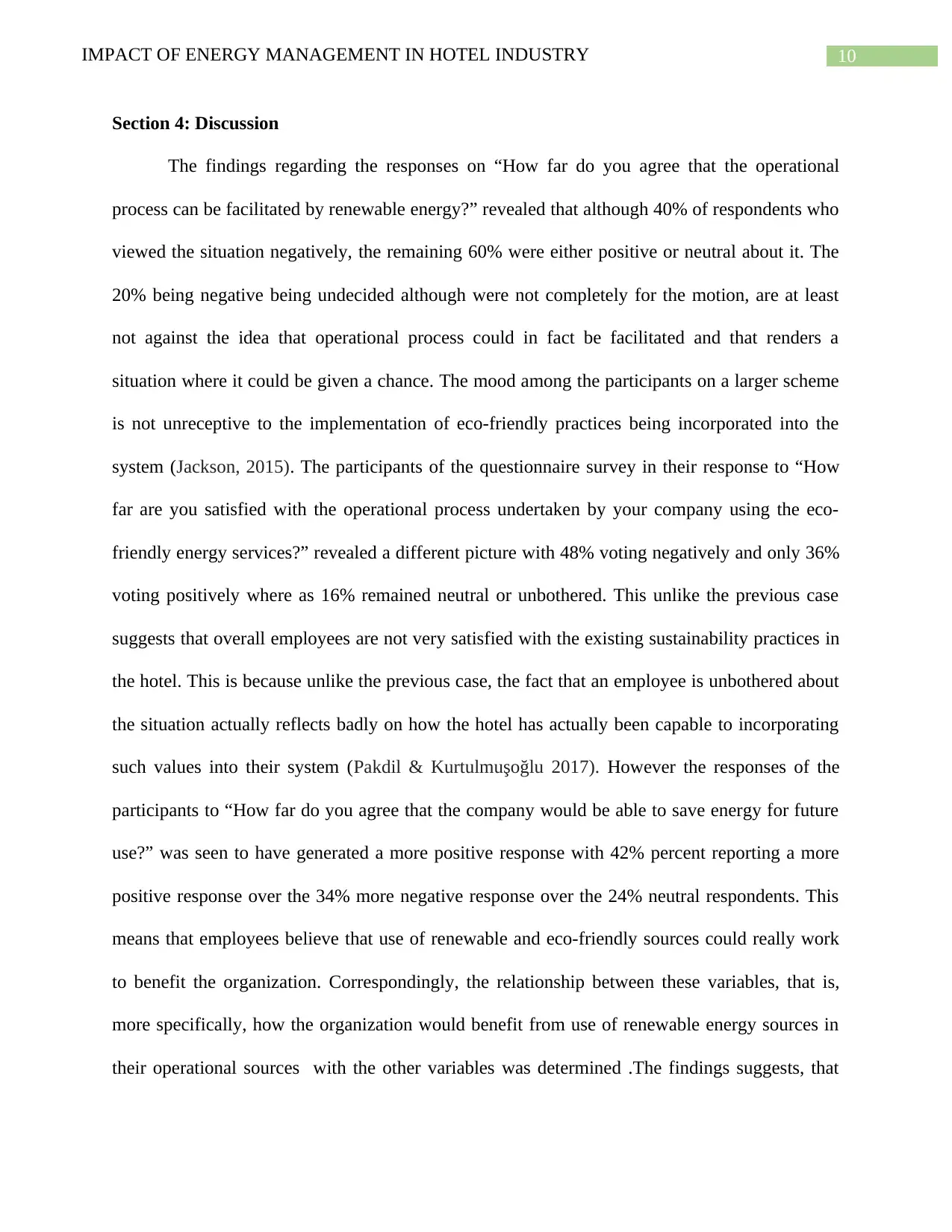
10IMPACT OF ENERGY MANAGEMENT IN HOTEL INDUSTRY
Section 4: Discussion
The findings regarding the responses on “How far do you agree that the operational
process can be facilitated by renewable energy?” revealed that although 40% of respondents who
viewed the situation negatively, the remaining 60% were either positive or neutral about it. The
20% being negative being undecided although were not completely for the motion, are at least
not against the idea that operational process could in fact be facilitated and that renders a
situation where it could be given a chance. The mood among the participants on a larger scheme
is not unreceptive to the implementation of eco-friendly practices being incorporated into the
system (Jackson, 2015). The participants of the questionnaire survey in their response to “How
far are you satisfied with the operational process undertaken by your company using the eco-
friendly energy services?” revealed a different picture with 48% voting negatively and only 36%
voting positively where as 16% remained neutral or unbothered. This unlike the previous case
suggests that overall employees are not very satisfied with the existing sustainability practices in
the hotel. This is because unlike the previous case, the fact that an employee is unbothered about
the situation actually reflects badly on how the hotel has actually been capable to incorporating
such values into their system (Pakdil & Kurtulmuşoğlu 2017). However the responses of the
participants to “How far do you agree that the company would be able to save energy for future
use?” was seen to have generated a more positive response with 42% percent reporting a more
positive response over the 34% more negative response over the 24% neutral respondents. This
means that employees believe that use of renewable and eco-friendly sources could really work
to benefit the organization. Correspondingly, the relationship between these variables, that is,
more specifically, how the organization would benefit from use of renewable energy sources in
their operational sources with the other variables was determined .The findings suggests, that
Section 4: Discussion
The findings regarding the responses on “How far do you agree that the operational
process can be facilitated by renewable energy?” revealed that although 40% of respondents who
viewed the situation negatively, the remaining 60% were either positive or neutral about it. The
20% being negative being undecided although were not completely for the motion, are at least
not against the idea that operational process could in fact be facilitated and that renders a
situation where it could be given a chance. The mood among the participants on a larger scheme
is not unreceptive to the implementation of eco-friendly practices being incorporated into the
system (Jackson, 2015). The participants of the questionnaire survey in their response to “How
far are you satisfied with the operational process undertaken by your company using the eco-
friendly energy services?” revealed a different picture with 48% voting negatively and only 36%
voting positively where as 16% remained neutral or unbothered. This unlike the previous case
suggests that overall employees are not very satisfied with the existing sustainability practices in
the hotel. This is because unlike the previous case, the fact that an employee is unbothered about
the situation actually reflects badly on how the hotel has actually been capable to incorporating
such values into their system (Pakdil & Kurtulmuşoğlu 2017). However the responses of the
participants to “How far do you agree that the company would be able to save energy for future
use?” was seen to have generated a more positive response with 42% percent reporting a more
positive response over the 34% more negative response over the 24% neutral respondents. This
means that employees believe that use of renewable and eco-friendly sources could really work
to benefit the organization. Correspondingly, the relationship between these variables, that is,
more specifically, how the organization would benefit from use of renewable energy sources in
their operational sources with the other variables was determined .The findings suggests, that
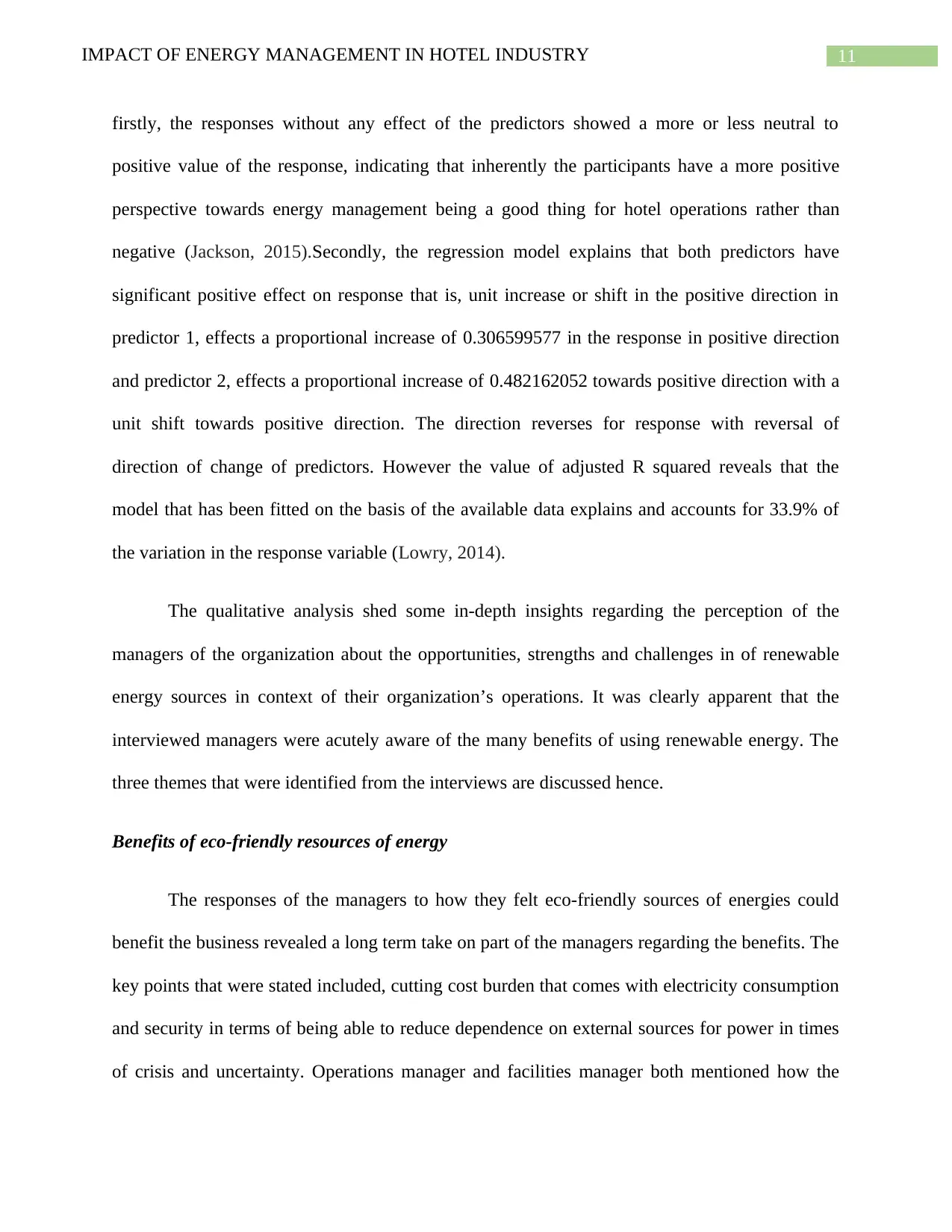
11IMPACT OF ENERGY MANAGEMENT IN HOTEL INDUSTRY
firstly, the responses without any effect of the predictors showed a more or less neutral to
positive value of the response, indicating that inherently the participants have a more positive
perspective towards energy management being a good thing for hotel operations rather than
negative (Jackson, 2015).Secondly, the regression model explains that both predictors have
significant positive effect on response that is, unit increase or shift in the positive direction in
predictor 1, effects a proportional increase of 0.306599577 in the response in positive direction
and predictor 2, effects a proportional increase of 0.482162052 towards positive direction with a
unit shift towards positive direction. The direction reverses for response with reversal of
direction of change of predictors. However the value of adjusted R squared reveals that the
model that has been fitted on the basis of the available data explains and accounts for 33.9% of
the variation in the response variable (Lowry, 2014).
The qualitative analysis shed some in-depth insights regarding the perception of the
managers of the organization about the opportunities, strengths and challenges in of renewable
energy sources in context of their organization’s operations. It was clearly apparent that the
interviewed managers were acutely aware of the many benefits of using renewable energy. The
three themes that were identified from the interviews are discussed hence.
Benefits of eco-friendly resources of energy
The responses of the managers to how they felt eco-friendly sources of energies could
benefit the business revealed a long term take on part of the managers regarding the benefits. The
key points that were stated included, cutting cost burden that comes with electricity consumption
and security in terms of being able to reduce dependence on external sources for power in times
of crisis and uncertainty. Operations manager and facilities manager both mentioned how the
firstly, the responses without any effect of the predictors showed a more or less neutral to
positive value of the response, indicating that inherently the participants have a more positive
perspective towards energy management being a good thing for hotel operations rather than
negative (Jackson, 2015).Secondly, the regression model explains that both predictors have
significant positive effect on response that is, unit increase or shift in the positive direction in
predictor 1, effects a proportional increase of 0.306599577 in the response in positive direction
and predictor 2, effects a proportional increase of 0.482162052 towards positive direction with a
unit shift towards positive direction. The direction reverses for response with reversal of
direction of change of predictors. However the value of adjusted R squared reveals that the
model that has been fitted on the basis of the available data explains and accounts for 33.9% of
the variation in the response variable (Lowry, 2014).
The qualitative analysis shed some in-depth insights regarding the perception of the
managers of the organization about the opportunities, strengths and challenges in of renewable
energy sources in context of their organization’s operations. It was clearly apparent that the
interviewed managers were acutely aware of the many benefits of using renewable energy. The
three themes that were identified from the interviews are discussed hence.
Benefits of eco-friendly resources of energy
The responses of the managers to how they felt eco-friendly sources of energies could
benefit the business revealed a long term take on part of the managers regarding the benefits. The
key points that were stated included, cutting cost burden that comes with electricity consumption
and security in terms of being able to reduce dependence on external sources for power in times
of crisis and uncertainty. Operations manager and facilities manager both mentioned how the
⊘ This is a preview!⊘
Do you want full access?
Subscribe today to unlock all pages.

Trusted by 1+ million students worldwide
1 out of 20
Related Documents
Your All-in-One AI-Powered Toolkit for Academic Success.
+13062052269
info@desklib.com
Available 24*7 on WhatsApp / Email
![[object Object]](/_next/static/media/star-bottom.7253800d.svg)
Unlock your academic potential
Copyright © 2020–2026 A2Z Services. All Rights Reserved. Developed and managed by ZUCOL.





